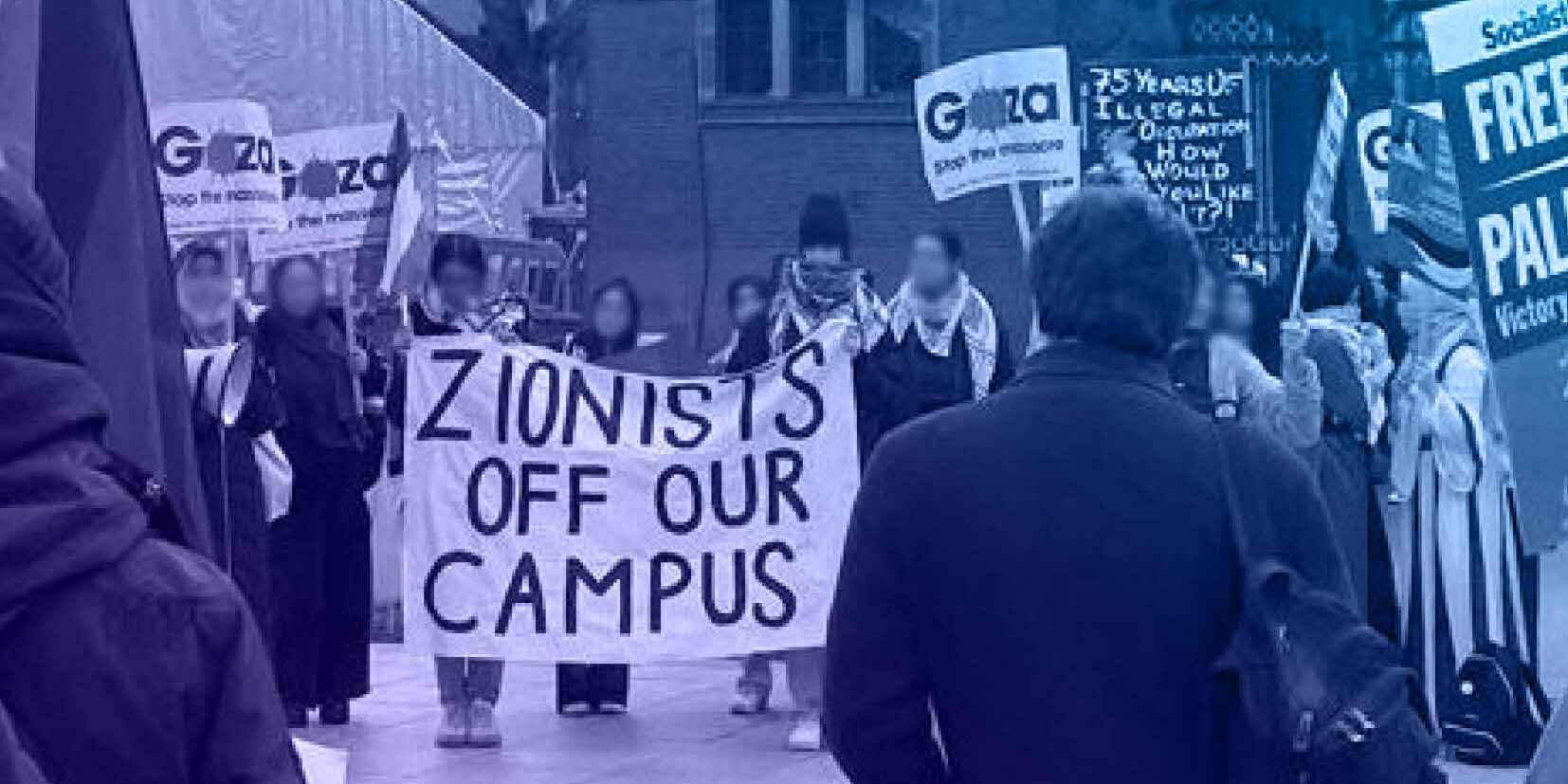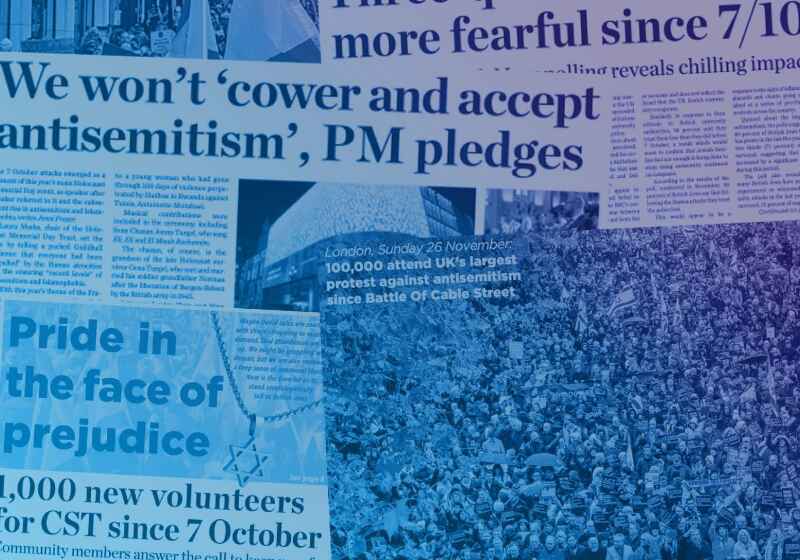CST Blog
117% increase in campus antisemitic incidents
9 December 2024

Today CST launches its third biennial campus antisemitic incidents report. CST has recorded a total of 325 university-related antisemitic incidents in the last two academic years: 53 incidents in 2022/23 and 272 in 2023/2024.
This is a record total for university-related antisemitic incidents and marks a 117% increase from the 150 university incidents recorded in 2020-2022, the two academic years covered in CST’s previous report.
In the 2023/24 campus year, the 272 university-related antisemitic incidents recorded by CST marked the highest total ever recorded for a single academic year. This can primarily be attributed to the wave of anti-Jewish hatred following the 7 October Hamas terror attack in Israel and the subsequent ongoing war in the Middle East that has led to a sharp rise in antisemitic incidents nationwide.
In the 2022/23 academic year CST recorded 53 antisemitic incidents a drop from the 55 incidents recorded in the 2021/22 academic year.
While Jewish life on campus is vibrant with a wealth of opportunities contributing to many positive experiences for Jewish students anti-Jewish hatred has presented a greater challenge for Jewish staff, students and chaplains since 7 October 2023 than has been encountered in previous years.
In addition to the antisemitic incidents recorded in this report, CST received an unprecedented number of complaints of pro-Palestinian campaigning at universities that featured extreme, sometimes violent, rhetoric towards Israel, calls for “Zionists” to be excluded, or implicit support for terrorism. These reports did not meet CST’s criteria for antisemitic incidents however, they form an important part of understanding why so many Jewish students, academics and staff experienced what they felt to be a hostile environment on campus.
In April and May 2024, several pro-Palestinian student encampments were established across the UK to pressurise their respective universities to take various anti-Israel measures. CST recorded six reports of antisemitic incidents associated with student encampments, five of which were Abusive Behaviour, and one that involved a direct threat.
CST’s recommendations for universities:
- An independent process for complaints of discrimination, bigotry or hateful language should be developed by universities. This means ensuring that staff assessing complaints do not have a known or close relationship with the member of staff or student involved, where possible engaging external advisers with specialist expertise in the type of discrimination or bigotry being alleged.
- Institutions ought to ensure that the adoption of the IHRA definition of antisemitism is accompanied by training for staff who will be investigating complaints so that they know how to use the definition, and have a wider understanding of the nature, language and impact of antisemitism on British campuses.
- In times of heightened tension, universities should take care to formulate public stances and messaging that emphasise support for all students and do not ostracise Jewish students.
- Universities should take care to act on complaints within a reasonable timeframe. Where delays cannot be avoided every effort should be made to ensure frequent communication to inform the student of delays, progress made and when they can expect a response.
- Ensure the confidentiality of students reporting incidents where possible.
- Initial complaint and/or reporting forms should incorporate a specific space for students to say that they have specifically been the victim of an antisemitic hate crime.
- Universities should take action to ensure that encampments are not established in central areas of campus that impede or obstruct the regular flow of student life and that external individuals are restricted in their ability to access formal and informal (but established) student groups on university property. Appropriate investigation and disciplinary procedures must be taken against students who promote antisemitism or other forms of extremism.
CST continues to work with the Union of Jewish Students (UJS) and other campus organisations to ensure that students, academics and others who experience antisemitism can receive advice and support to help them bring the matter to a successful resolution. The CST campus team regularly provides advice to Jewish students and societies on organising events safely. CST also works with different organisations to teach students about topics relating to antisemitism and extremism on campus. It is hoped, as with all CST’s work, that this will contribute to the building of a safer and more inclusive environment for Jewish students and staff.
In response to CST’s new report, CST Chief Executive Mark Gardner said:
“British universities have suffered for decades with antisemitism, but these latest figures are worse than ever before. Jewish students should be able to lead a normal life and CST’s report includes several recommendations to help crack down on anti-Jewish hatred and provide Jewish students with the support and protection that they need and deserve. Ultimately, this comes down to university authorities, government and police standing up to extremists who are permitted to harass, intimidate and disrupt on campus. This bullying can be from students or staff, and it inflicts harm upon anyone deemed to disagree with them.”
Union of Jewish Students, Sami Berkoff said:
“The findings of the CST Campus Antisemitism Report 2022-2024 paint a stark picture of the challenges faced by Jewish students and staff on UK campuses. It is clear that urgent action is needed. It is essential to recognise that antisemitism does not exist in a vacuum. The legitimisation of extremist rhetoric on campuses, including support for terror groups, emboldens protestors and further alienates Jewish students. Universities must reaffirm their commitment to being inclusive spaces by taking strong and unequivocal stances against all forms of hate. I am proud of the 9,000+ Jewish students I represent for continuing to be strong and resilient in the face of such a turbulent rise in antisemitism. No student should need to choose between their faith and their education or feel unsafe expressing their identity. If universities fail to protect Jewish students, they fail in their broader mission to foster safe and inclusive communities for all. We remain committed to advocating for Jewish students, ensuring their voices are heard and building partnerships with universities to drive meaningful change.”
HM Government’s Independent Adviser on Antisemitism Lord Mann, said:
“CST's campus report paints a worrying picture of rising levels of antisemitism on university campuses. Both students and parents are rightfully concerned over the safety and protection of the Jewish student community. The Union of Jewish Students continues to be a strong voice on this matter, and has done a remarkable job of empowering students to report antisemitism when it occurs. My 2022 report, 'Understanding Antisemitism in Higher Education', produced by the Parliamentary Taskforce on Antisemitism in Higher Education, made a number of recommendations for tackling antisemitism on campuses which are still live with government. I will continue to work alongside CST and UJS to ensure that Jewish students feel safe and able to live their lives at university, free from discrimination and hate.”
Education Secretary Bridget Phillipson, said:
“These findings are sickening. It is an absolute disgrace that Jewish students feel unable to participate fully in university life due to the abhorrent rise in antisemitic abuse detailed in this report and we are determined to change this as a matter of urgency. It shows we have a long way to go to combat antisemitism in our society. The Government remains firmly committed to tackling antisemitism across the country and stamping out hatred wherever it occurs. We have pledged £7 million to combat antisemitic abuse in schools, colleges, and universities, with £500,000 already allocated to the University Jewish Chaplaincy to support student welfare.”
Read the full Campus Antisemitism in Britain 2022-2024 report.


